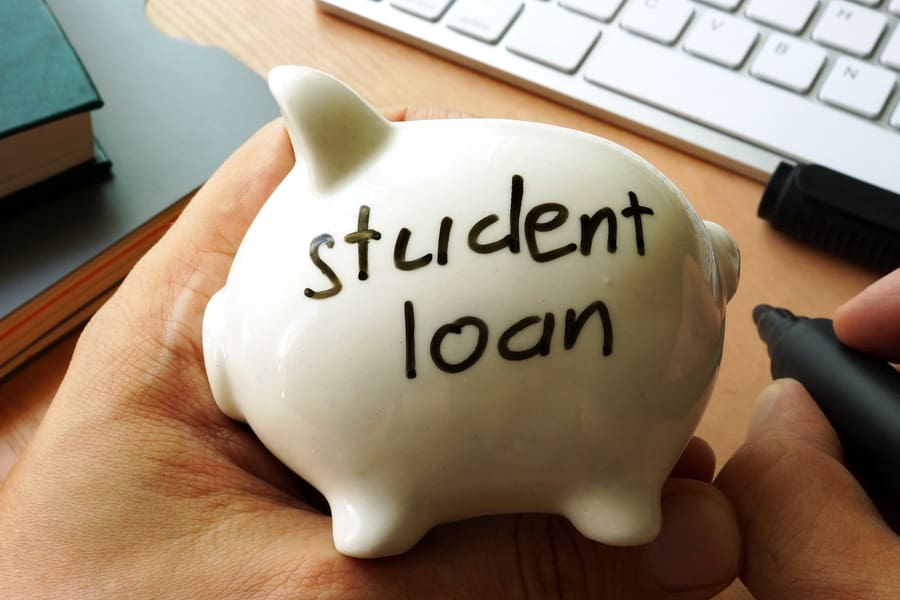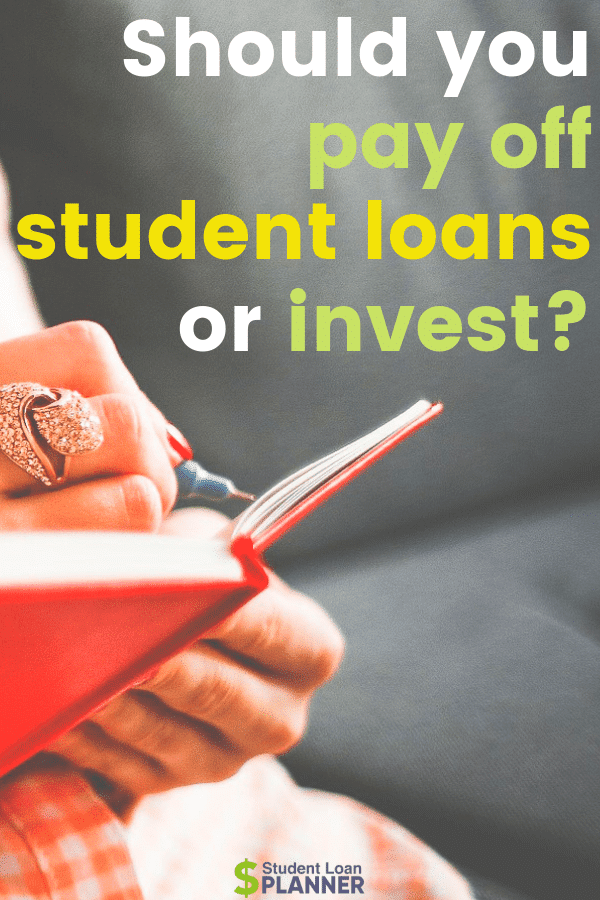I got an odd message on LinkedIn the other day that reminded me why people wonder if they should pay off student loans or invest. This “guru” who happened to have a professional degree told me I was doing my clients a huge disservice. He told me that I needed to make sure my readers refrained from paying down their student loans to invest instead.
Whenever someone expresses great certainty and confidence in finance, I become very skeptical. I decided to play along, so I asked what rates of return he thought people could get in the markets.
“12 to 15 percent with my tips,” he replied.
That’s when I knew he was one of two things:
- An idiot
- Someone trying to make a lot of money off naive people
Investing instead of paying off student loans was the clear winner the past decade
Many people who did not have significant amounts of money invested during 2008 have only known the past decade of fantastic stock market returns. When you pay down debt, you get a guaranteed return, which is one of the benefits of paying student loans off debt early.
The past 10 years have been amazing for investing. When I wrote this, Vanguard's S&P 500 Index Fund showed an annualized return of almost 15% since 2009.
Even if you had student loan debt at an 8% back in 2009, you would've cost yourself a massive amount of money if you decided to pay off student loans over investing.
However, past performance is no guarantee of future results.
Vanguard, the same mutual fund company that turned in the otherworldly investment performance above, predicts that stock returns over the next 10 years will be between 3% and 5% annualized.
That's terrible!
Is financial planning with SLP Wealth right for you?
Looking for student loan aware financial planning custom tailored for professionals like you? Check out the discounts below for becoming a client of SLP Wealth (our SEC Registered Investment Advisory firm).
SLP Wealth, LLC (“SLP Wealth”) is a registered investment adviser registered with the United States Securities and Exchange Commission with headquarters in Durham, NC.
The next decade will likely reward paying off student loans (with one big exception)
Paying off federal loans is never a good decision if you should go for forgiveness. If you can qualify for the Public Service Loan Forgiveness program or IDR loan forgiveness over 20 to 25 years (with a debt to income ratio above 2), you should not pay off your student loans. Using student loan forgiveness means that you should be investing whatever you want to put down on your loans instead.
If you owe less than 1.5 times your income and work in the private sector, you will probably need to get rid of your loans. That means the “pay off student loans or invest” decision is a real debate.
In that case, the psychic benefits of being debt-free are so great that only retirement savings and having an emergency fund should come first.
Trying to decide between paying down student loans and investing is a legit difficult decision.
- Figure out whether you should be paying down the student loans at all.
- Determine if paying down the your loan's balance prevents you from achieving other important financial goals like saving for retirement or buying a house.
We’ll apply these two rules so you can be confident the next time you mail a check to your loan servicer for more than your minimum payment.
Should you pay off your student loans early?
Regular readers will know that I suggest that if you owe more than two times your household income (and will for the foreseeable future), you’re most likely better off going for loan forgiveness.
To do this, you should probably choose between the Pay As You Earn (PAYE) and Revised Pay As You Earn (REPAYE) programs. After 20-25 years of payments, you’ll owe taxes on the leftover forgiven student loan balance as if it was income.
If you work in a not-for-profit or government employer, you could qualify for the 10-year tax-free version of forgiveness called PSLF. Then you won't even owe any taxes.
Either way, if you could benefit from forgiveness, why would you pay off your student loans early? That's just wasting money. Also, rest assured tax rates will likely increase to pay for our expensive student loan system in the future.
However, if you have private loans or federal student loans you'd like to refinance, I would follow this path:
- Get $10,000 or three months expenses in your bank account
- Contribute the maximum to retirement of $19,000 (if it's a 401k)
- Save for critical goals like a house or starting a family
- Use excess funds to pay off student loans
- Once the loans are gone, invest the excess money in a brokerage account with a place like Betterment (referral link, gets you 1 month to 1 year managed free)
You can test out different scenarios with our Student Loan Payoff Calculator or our all-in-one calculator.
Take advantage of the student loan rules guilt-free

People often tell me it makes them feel guilty not to pay back what they borrowed. In this case, guilt makes no sense. Anyone with loans from grad school utilized a system that’s so screwed up it’s not even funny. Prices for higher education would be much lower without the unlimited borrowing the federal government’s system allows.
Hence, take full advantage of whatever you can to ensure your long-term financial health. We do this all the time for borrowers with more than $100,000 in student debt with our consult service.
If you’re going to use loan forgiveness, do not make any extra payments on your student loans. Put the money into retirement accounts, brokerage accounts, and savings instead.
The answer to the question “do I invest or pay down loans” is easy in this forgiveness situation. Never pay down loans that have a large projected forgiven amount. Since paying down debt is not an option, in this case, invest instead.
Investing in this account is better than paying off student loans
Guess what the average contribution is to a retirement plan? Typically, it’s close to the employer’s matching percentage. That’s a big mistake since the maximum contribution allowed to most employer-sponsored retirement plans is $19,000 for 2019.
You can’t play catchup later in life because you made small contributions in your 20s and 30s. Many grad degree holders try to anyway by maximizing their 401k’s and 403b’s throughout their 50s and 60s since they barely saved early on in their careers.
Here’s a good rule of thumb when deciding whether it's better to invest to pay off student loan debt. You should plan on paying down your student debt in less than 10 years unless you have an interest rate less than 3%.
Once you are paying off student loans at this pace at minimum, you next want to make sure your retirement accounts are maximized for both you and your spouse.
What kind of retirement accounts can I use?
Many of you have a formal 401k or 403b plan that comes with an employer match. This is the $18,500 max contribution I’m talking about. The only catch is that your employer must be the one to offer it. You can’t go set up one on your own (unless you run the whole business where you work).
If you work at a small employer (think mom and pop vet or dental practice), you might not have anything offered to you for retirement.
Rather than save nothing, you should start a Traditional IRA if you have no employer-sponsored plan. Why didn’t I say something about the Roth IRA?
It’s because I think the Roth is overhyped. The vast majority of workers will be in a lower tax bracket in retirement. Hence, you’d be better off saving more now and getting the tax cut today and paying taxes later. If you don’t have a 401k or 403b through work, you can deduct the contribution to the Traditional IRA completely regardless of income.
I’ve occasionally seen other kinds of retirement plans like SIMPLE IRAs. Just look up the max contribution and make sure you’re hitting that.
Is it better to pay off student loans or save for retirement?

Recall that I said you should be paying down your loans within 10 years or maybe you shouldn’t pay them down at all.
Take a look at the Standard 10-year monthly payment. If that’s not possible for your budget, it’s often a signal that one of the loan forgiveness programs would be a better fit. Feel free to contact us if that’s you.
Let’s call our $200,000 borrower from earlier “Will the physician.” His payments on a 5-year term would be around $4,000 a month. The 10-year term would be about $2,000 a month.
Will earns $250,000 a year, which amounts to about $12,000 a month after taxes. His rent is $3,000, daycare is $2,500, and car payments and insurance sum up to $1,000 for the family. Everything else comes out to $2,500 monthly, leaving them $3,000 for debt, retirement, and saving.
With these constraints, Will could not afford the 5-year payment. Left to his own devices, he would likely choose a long student loan repayment term of 15 to 20 years and contribute the bare minimum to his retirement plan to get the full employer match. What should Will do?
Fix your spending problem to rock both student debt payoff and retirement
Will is living like a rich attending doctor instead of the broke man that he is. Since he’s renting, I’d encourage him to downsize to a $2,000 monthly apartment and sell his family’s vehicles. In their place, I’d suggest buying two $5,000 cars with over 100,000 miles on them to ditch the car payments.
With his tax bracket, maximizing his 401k would only cost him about $1,000 a month in take-home pay since he’d get the deduction today.
However, now he can afford a 7-year repayment term instead of keeping the loans around for 10 years. Why would he do that instead of invest in a taxable brokerage account?
Fund retirement first, then throw any extra at student debt
The primary reason is that retirement accounts protect you from yourself. I have a good friend who put about 20% of his net worth in the recently crashed XIV inverse volatility ETF. In one day, it fell over 90%.
Another friend put all his money in bitcoin. While this worked out for him well so far because of his early entry point, he lost a huge sum when he insisted on holding onto what he owned even when I called him once bitcoin hit 20,000 a few month ago.
Retirement accounts are highly regulated to make sure that most workers get decent long-term returns. Most people get shoved into well-diversified retirement funds with reasonable fees. To top it off, these retirement savings grow tax-free until you withdraw them to fund your retirement.
Taxable brokerage account savings have no tax protection. You pay a huge tax on interest-bearing instruments like bonds and bank CDs. Stock dividends carry a lower tax rate, but then you’re subject to the swings of the market.
Student loan interest is not tax deductible. That means you get a guaranteed return that’s going to be higher than many corporate bonds without taking ANY credit or interest rate risk. Many people would kill for a 3% savings account. Paying off student loans in full gets you something similar.
Should you pay off student loans or save?
When you earn interest on a savings account, you must pay taxes on the interest income at the ordinary income tax rate.
Pretend your combined federal, state, and local marginal tax rate is 30%. If you earn 2 percent in a savings account, your after tax yield is 1.4%.
If you have a student loan interest rate below 1.5%, you probably owe money to your parents or grandparents. Then it's more of a personal choice as to how soon you want to be independent of your relatives.
Clearly, if you know you need to pay off your student loans, that takes precedence over savings in terms of pure return.
However, what if paying down your student loans instead of saving would delay purchasing a house or having a baby?
In that case, saving should be the priority. There is a large personal and emotional cost to having student loan debt affect your big life decisions.
Finally, if you have credit card debt or simply live paycheck to paycheck, you need to get several months' expenses stashed away in savings first. Paying off student loans won't help at all if you have an emergency, miss some payments, and rack up a high credit card balance.
Establish financial stability in your life before getting aggressive with student loans, even those with a higher interest rate. When figuring out whether to pay off student loans or save, protect yourself from emergencies then get to work on your debt (unless forgiveness is better, in which case invest).
Use 3 tips to navigate the pay off student loans or invest decision

- To recap, look at the 10-year fixed rate monthly payment for your student loans. If that amount is not feasible, you probably should use loan forgiveness strategies or cut back on your spending.
- If paying your student loans back makes the most sense, then refinance your loans with a private lender to lock in a lower interest rate. Leave yourself enough room in your budget to maximize your retirement accounts. For most, that means an $18,500 annual contribution for both you and your spouse.
- Any extra money should go into your loans as lump sum payments.
You spent years of your life struggling in school and borrowing massive sums of money to be financially free. While you can get there no matter what even if you owe half a million, the dream is to achieve debt freedom through rapid student loan payments.
Still wondering if you should pay down student loans or start investing given your current financial situation? Recall that you can always start off with a longer student loan term (as in a 10-15 year loan) then refinance a year or two later. This might be a reasonable solution for a borrower who would like to save money by locking in a lower interest rate while also maxing their retirement accounts.
Just make sure that your first big raise goes straight into your student debt and not to a vacation in Oahu. Struggle and live like you’re still in school at least until you owe less than $100,000 in student debt or have that much saved for retirement if you’re going for loan forgiveness.
Your future 50-year-old self will thank you enormously.
Get the best discounts for financial planning with SLP Wealth
See what discounts you could get by filling out the form below.
SLP Wealth, LLC (“SLP Wealth”) is a registered investment adviser registered with the United States Securities and Exchange Commission with headquarters in Durham, NC.

Comments are closed.